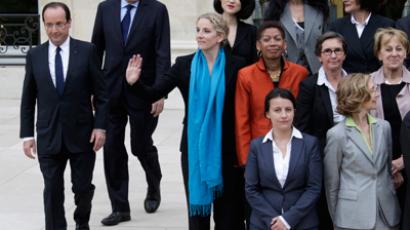France’s Socialists win parliament: What next?
France's Socialist Party has won an absolute majority in the second round of parliamentary voting, exit polls suggest. But Hollande, who now controls the entire parliament, is unlikely to deliver on his promises, says former Belgian MP Lode Vanoost.
The Socialist Party (PF) has won 300 seats, surpassing the 289 seats required for total control of the 577-member National Assembly after Sunday's run-off. Nicolas Sarkozy's center-right Union for a Popular Movement (UMP) secured 207 seats.France's far-right National Front has returned to parliament for the first time since 1998, according to AFP reports, but its anti-immigrant and anti-EU leader Marine Le Pen has lost her bid for a seat by a handful of votes.The outcome of both rounds of France’s parliamentary elections suggests that President Francois Hollande will now be able to implement his tax-and-spend policy with relative ease. But how likely is that he can achieve economic growth instead of belt-tightening? RT discussed the issue with an international consultant and former deputy speaker of the Belgian Parliament.RT: France – the eurozone's second-biggest economy – has gone socialist and anti-austerity. How big of a blow does this deal to the currency union?Lode Vanoost: Let me begin by stating that a people-oriented – call it socialist if you will – anti-austerity policy is exactly what the European Union needs. But will this come from France? I highly doubt it. If history teaches any lesson, the Socialist Party of France, ever since the election of President Mitterrand in the 1980s, has taken up neo-liberal policies, privatization. Let’s not forget that Francois Hollande and his former wife Segolene Royal are former aides [to] Francois Mitterrand, and if you look at their careers of the last 20 years, I have no doubt that this is not the case for France for the moment.RT: Francois Hollande has been pushing for a growth pact which would include such measures as creating jobs. And that means spending. How realistic are his plans?LV: In itself, that’s an excellent idea, I think. If he really means it, that would be very positive for the people of France and would set a good example for the rest of the European Union. But again, I highly doubt it. I think, in the first month, maybe the first year, he will take some tepid steps in that direction, but slowly he will start using the European Union as an excuse for just keeping the austerity plan going and for the growth plan being some minor thing. I don’t really trust the man on that issue, not at all.RT: We've been seeing anti-austerity protests across debt-stricken EU countries over the weekend with protesters in Portugal, for example, accusing the IMF, European Central Bank and European Commission of “plundering” the country. Do you think their words are justified?LV: Absolutely! This is exactly what’s happening. The European Central Bank, the IMF are neo-liberal institutions, and basically, what they are now doing is exactly what happened in the 1970s in Latin America – that is the deconstruction or, if you want, total destruction of the social welfare state as it was established after WWII for the benefit of banks, financial elites, etc. It’s not a secret that what they call “regrettable consequences of this policy” are very much objectives that they aim at.














